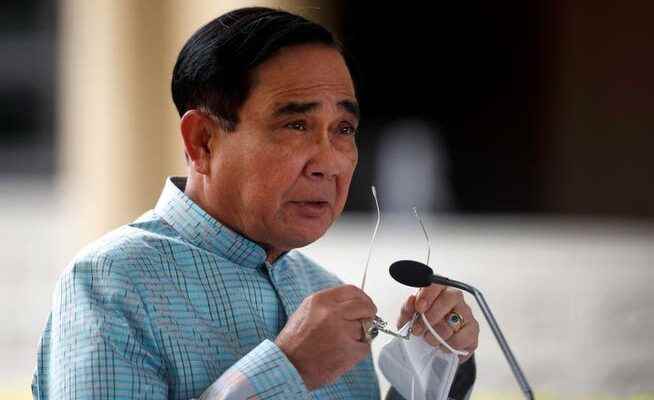Thai Prime Minister Prayut Chan-ocha has been forced to step down from power. The decision is a sign of hope for the democracy movement.
Thailand’s Supreme Court surprisingly suspended Prime Minister Prayut Chan-ocha on Wednesday.
Autocrats rarely resign voluntarily. There is no international lack of evidence for this. That this also applies to Thailand’s Prime Minister Prayut Chan-ocha has recently become increasingly clear. The former general and army chief, who seized power in 2014, promised at the time that he would relinquish government power after a year had been restored. As is well known, things went very differently: On Wednesday morning, the eighth anniversary of the coup, Prayut still holds the reins in his hand.
But a few hours later, what few in the kingdom expected happened. The Constitutional Court, which considered the eight-year term on the same day, decided to suspend Prayut with immediate effect.
It must examine more closely whether the 68-year-old can lawfully remain head of government. The Supreme Court is thus reacting to a parliamentary initiative from opposition circles. Their demand relates to the new constitution, which stipulates that a prime minister can be in office for a maximum of eight years.
The royal family acts in the background
It is disputed whether the measure for Prayuth is actually full. The provisional suspension does not mean that Prayut will or must definitely step down. However, until the final decision of the judges – probably in a few weeks – he will not be able to continue in his function. It will be transferred to one of his deputies, presumably Deputy Prime Minister Prawit Wongsuwan, also a former army chief and a staunch companion of Prayut. From this point of view, not much changes at first.
It is still unclear whether the judges’ stop signal is equivalent to a political change in the kingdom. This much is certain: In Thailand, this case is not about flawless, fine-grained legal clarifications either. It’s about political wind strength, power and calm in the kingdom. Who can guarantee this after years of instability and economic stagnation? Prayut’s standing does not improve with the oracle of the judiciary. He is unpopular and has faced calls for his resignation for years.
Speaking of power and stability: With regard to the royal family, observers in Bangkok believe that Prayuth’s time could actually be up. The hand in the background is not visible, but it is well known. The timing and procedure to get rid of him after eight years would actually be perfect. The decisive factor is therefore not the legal profession, but the question of who is the head of government and who is the guarantor of stability. In the past coups were putsch with brute force, today finer strings are pulled.
Tight vote by the judiciary
In Bangkok, it had been expected in advance that the constitutional court would reject the petition. Or – otherwise – would leave Prayut in office at least until clarification. With the suspension, however, the judges are going a step further. Not without controversy and with a close decision, nota bene: five judges voted for a suspension, four were against. It is considered certain that the judges did not lose sight of the real and royal power constellations.
From a purely factual and formal legal point of view, the initial situation can actually be interpreted differently. If one counts Prayut’s years as head of the military junta from 2014, eight years would effectively be the full constitutional limit. On the other hand, anyone who argues that the term limit will only apply after the new constitution of 2017 comes into force, grants Prayut several more years, at least until the new elections in 2023 the elimination of the (most important) opposition party Future Forward and thanks to further trickery finally emerged as the winner.
The suspension is interesting from another perspective. After the amnesia and shock that have prevailed since the suppression of the protest movement, the verdict is once again creating some political tension in Thailand. And it supplies the opposition parties and the democracy movement, which has largely been stifled in the course of the fight against the pandemic, with some oxygen.
